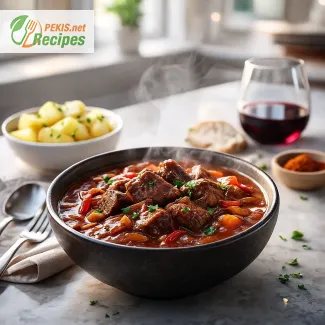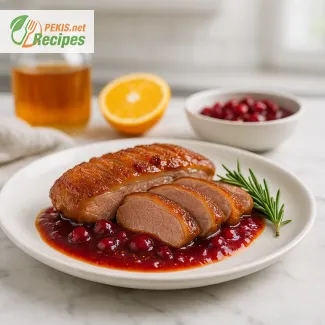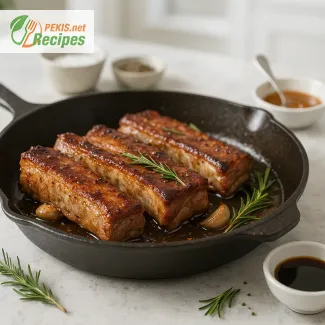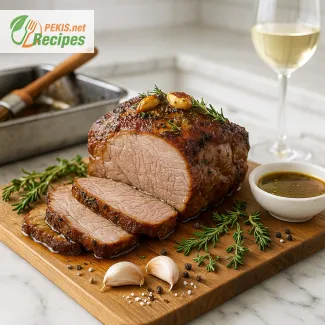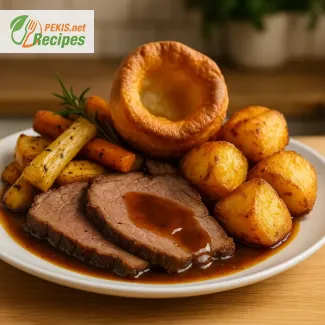
A traditional British feast reimagined for the modern home cook
The essence of a perfect roast beef Sunday dinner with golden potatoes and Yorkshire pudding
There's something deeply comforting about gathering around the table for a classic British Sunday roast. Whether it’s the succulent roast beef, the crisp-on-the-outside, fluffy-on-the-inside roast potatoes, or the airy Yorkshire puddings that steal the show, this time-honoured tradition brings people together like few other meals can. More than just a dish, the Sunday roast is a weekly ritual in many British households—rooted in centuries of culture, cherished memories, and the universal pleasure of slow-cooked goodness.
This ultimate Sunday roast recipe elevates the classic components of this meal into something unforgettable. With tender beef roasted to perfection, golden potatoes roasted in fat until deliciously crispy, and Yorkshire puddings that rise to golden heights, every element of this meal is designed to satisfy. And it doesn’t stop there—the supporting cast of vegetables, rich gravy, and perhaps a touch of horseradish sauce complete the plate with balance and flair. It's hearty, it's nostalgic, and it's unmistakably British.
The key to mastering this British dinner tradition lies in attention to detail. Choosing the right cut of beef, preparing your potatoes for maximum crunch, and getting the timing just right on your Yorkshire pudding batter are all critical. While these components may seem simple on the surface, they each demand a little care and technique to deliver the kind of roast that leaves a lasting impression. This recipe takes you through each step with clarity, giving you the tools to recreate the perfect roast dinner in your own kitchen.
In Britain, the Sunday roast is more than a meal—it’s a symbol of comfort, family, and tradition. For centuries, families have come together at the end of the week to share roast meat with seasonal vegetables, savory sides, and luscious gravies. Over time, it has evolved to include regional variations, from the beef and Yorkshire pudding of northern England to lamb with mint sauce in the south, or pork with crackling and apples in the west. Yet, the roast beef version with all its trimmings remains the most iconic and widely beloved.
Part of what makes this roast beef dinner so satisfying is the way each element complements the others. The rich, juicy beef pairs perfectly with the starchy crispness of roast potatoes, while the Yorkshire puddings soak up the meat’s juices and the robust gravy. Each bite is a harmony of textures and flavours—savory, golden, warm, and familiar. Even those unfamiliar with British cuisine find themselves enamored by the flavourful simplicity of a properly done Sunday roast.
Many home cooks wonder what sets an exceptional roast apart from an average one. Often, it's the small touches: letting the beef rest before slicing, preheating the fat before adding the potatoes, and ensuring your pudding tins are smoking hot before the batter goes in. Timing, too, is everything—balancing the cook of the beef with the crisping of the potatoes and the rising of the puddings demands a bit of choreography. This is why a Sunday roast dinner is both a pleasure and a craft.
What makes this particular Sunday roast recipe stand out is its balance of tradition and modern technique. It preserves the time-tested flavours and presentation of a British roast dinner, while offering thoughtful methods that enhance flavour and simplify preparation. You’ll learn how to prepare your roast beef for maximum tenderness and how to achieve the kind of crispy roast potatoes that shatter under your fork. The Yorkshire pudding recipe included is designed to rise reliably and achieve that signature puff and golden crust.
This meal is ideal for weekend gatherings, family dinners, or any time you want to slow down and celebrate food as connection. The aroma of beef roasting in the oven, the sizzle of potatoes in hot fat, and the sight of Yorkshire puddings rising majestically in the oven—these are the sights, sounds, and smells of true comfort. Whether you're British or simply love a great roast, this meal delivers warmth, satisfaction, and a touch of elegance to your table.
With this guide, you'll not only recreate a beloved dish—you’ll bring the spirit of Sunday roast into your kitchen, where good food and good company are always welcome.
1. Prepare the beef roast:
Preheat your oven to 200°C (390°F). Pat the beef sirloin dry and season generously with salt and black pepper. Heat a pan with olive oil (2 tbsp) and sear the beef on all sides until browned (approx. 3–4 min per side). Transfer to a roasting pan. Surround with roughly chopped carrots, parsnips, onion, garlic, rosemary, and thyme. Drizzle with olive oil (2 tbsp). Roast for 45–60 minutes, depending on desired doneness (use a meat thermometer: 55°C for medium rare).
2. Rest the meat:
Remove the beef from the oven and let it rest covered with foil for at least 15 minutes before slicing. This ensures the juices redistribute and keeps the roast tender.
3. Roast potatoes:
While the beef is roasting, peel and quarter the potatoes. Boil in salted water for 10 minutes. Drain and shake the pot to roughen the edges. Heat duck fat or vegetable oil in a roasting tray at 200°C (390°F), then add the potatoes carefully. Roast for 40–50 minutes, turning occasionally, until golden and crispy.
4. Make Yorkshire puddings:
Increase oven to 220°C (430°F). In a bowl, whisk eggs, milk, and flour into a smooth batter. Let rest for 20–30 minutes. Pour sunflower oil into each hole of a muffin or Yorkshire pudding tray and heat in oven until smoking hot. Carefully pour batter into each hole (¾ full). Bake for 20–25 minutes without opening the oven until puffed and golden.
5. Prepare the gravy:
While the meat is resting, strain the juices from the roasting pan into a saucepan. Add beef broth, bring to a simmer, and thicken with cornstarch mixed in a little cold water. Season to taste.
6. Assemble the dish:
Slice the beef and serve with roast potatoes, Yorkshire puddings, roasted vegetables, and gravy. Optionally, serve with horseradish sauce.
Elevating Your British Roast: Flavorful Twists and Smarter Techniques
Expert advice to upgrade your Sunday roast with modern flair and healthier choices
The traditional British Sunday roast is a meal deeply rooted in comfort and culture. Its core elements—roast beef, crispy potatoes, Yorkshire puddings, and rich gravy—create a sense of familiarity and nostalgia. However, even the most beloved classics can benefit from thoughtful improvements. Whether you're aiming for deeper flavor, healthier ingredients, or a more reliable outcome, this guide explores how to take your roast dinner to the next level without losing its soul.
Choosing the best cut of beef for deeper flavor and tenderness
The foundation of every great roast beef dinner lies in selecting the right cut. While sirloin is a popular choice for its balance between tenderness and flavor, experimenting with other cuts like ribeye roast, top rump, or even brisket can deliver a noticeable difference. Cuts with more intramuscular fat, such as ribeye, provide enhanced juiciness and flavor depth during roasting.
Aging is another factor often overlooked. Opting for dry-aged beef enhances umami intensity and results in a more complex taste. Although pricier, this small upgrade turns a good roast into a memorable one.
Enhancing Yorkshire puddings with technique and taste
A well-risen Yorkshire pudding is essential to any roast dinner. To elevate yours, rest the batter for at least 30–60 minutes before baking. This allows the flour to fully hydrate, resulting in a more structured and airy texture. For deeper flavor, substitute part of the milk with buttermilk, which adds a slight tang and helps with rise.
For a modern twist, try adding roasted garlic puree or fresh herbs like thyme to the batter. This creates a more aromatic profile that pairs beautifully with the richness of the beef.
Achieving the crispiest roast potatoes: science and seasoning
No Sunday roast is complete without perfectly crispy potatoes. The classic method—parboiling, roughing the edges, and roasting in hot fat—is tried and true. But you can go further.
Add a teaspoon of baking soda to the boiling water. It breaks down the exterior starch, creating more surface area and a crispier crust. Tossing the potatoes in semolina before roasting also enhances crunch.
Consider roasting in a mix of duck fat and olive oil for flavor complexity. Finish with flaky sea salt and a sprinkle of fresh rosemary or smoked paprika to introduce new layers of taste.
Smarter gravy: flavor layering without excess salt
Gravy is more than a sauce—it's the element that ties the whole plate together. To build a more complex and umami-rich gravy, start by deglazing the roasting pan with red wine or balsamic vinegar before adding stock. This adds acidity and depth.
Infuse the stock with dried mushrooms, bay leaves, or even a touch of miso paste for a savory boost. Replace cornstarch with arrowroot or reduce the liquid naturally for a smoother, more velvety finish.
Healthier swaps without sacrificing taste
While indulgence is part of the charm, a health-conscious Sunday roast is achievable with subtle changes. Choose leaner cuts of beef like eye of round or reduce portion sizes and focus more on vegetable sides. Roasting seasonal vegetables such as Brussels sprouts, butternut squash, or beets alongside the meat adds color, nutrition, and variety.
Swap duck fat for cold-pressed rapeseed oil to reduce saturated fat, and use wholemeal flour in Yorkshire puddings for added fiber. Use low-sodium stock in the gravy and skip the additional salt if the roast juices are already well-seasoned.
Homemade vs. store-bought: why home-cooked always wins
While pre-packaged components may save time, the difference in taste is unmistakable. Homemade Yorkshire puddings, for instance, have a lighter interior and crisper shell, while ready-made ones often lack freshness. Store-bought gravies can’t match the depth and individuality of those made with real pan drippings and fresh herbs.
Home-cooked meals also allow for ingredient control, making it easier to avoid preservatives, excess salt, and artificial additives. Most importantly, preparing a roast from scratch becomes a personal ritual—one that turns a routine meal into a meaningful event.
Avoiding common mistakes: what not to do
Even seasoned cooks can fall into familiar traps. One of the most common is overcooking the beef, resulting in dryness and loss of flavor. Use a meat thermometer for precise doneness: 55–57°C (130–135°F) for medium rare.
Another frequent mistake is not heating the oil before adding potatoes or batter. If the fat isn’t hot enough, the potatoes won’t crisp and the Yorkshires won’t rise. Preheat pans until the oil shimmers or just begins to smoke for optimal results.
Finally, don’t skip resting the meat. A 15-minute rest under foil allows juices to redistribute, making the beef more tender and flavorful.
Adding luxury: finishing touches and plating ideas
For a restaurant-level experience, consider a few finishing touches. A light drizzle of truffle oil over the potatoes or a shaving of horseradish root over the beef brings sophistication. Garnish with fresh thyme sprigs, parsley, or even a touch of lemon zest on the vegetables to brighten the plate.
Serve on pre-warmed plates, and plate each element with care to maintain temperature and showcase texture. Use a small ladle to apply gravy precisely rather than drowning the plate.
Why the Sunday roast is worth perfecting
A dish as steeped in tradition as the British Sunday roast deserves to be more than a routine. It’s a meal that brings people together—full of stories, aromas, and emotion. By adjusting small details, you can respect tradition while making the dish uniquely yours. Whether you’re cooking for two or twelve, these tweaks bring new life to a time-honored favorite while maintaining everything we love about it.
Allergens present in the recipe
- Gluten (wheat flour)
- Eggs
- Milk
Substitution tips for allergens and gluten
- Replace wheat flour with a 1:1 gluten-free flour blend (for Yorkshire pudding and gravy).
- Use plant-based milk (like oat or soy) in place of whole milk.
- Use egg substitute or chickpea flour-based vegan batter for Yorkshire pudding.
- Vitamin A: 680 µg – supports vision and immune health
- Vitamin B12: 2.4 µg – essential for red blood cell formation
- Vitamin D: 3.1 µg – important for calcium absorption and bones
- Iron: 5.2 mg – contributes to normal oxygen transport in the body
- Calcium: 140 mg – needed for the maintenance of normal bones and teeth
- Potassium: 930 mg – helps regulate fluid balance and nerve signals
- Magnesium: 48 mg – involved in over 300 biochemical reactions in the body
- Zinc: 6.3 mg – supports the immune system and wound healing
- Beta-carotene: 4.5 mg – converted into Vitamin A and supports skin health
- Polyphenols (from herbs and vegetables): 80 mg – protect cells from oxidative stress
- Glutathione (from beef): 6 mg – supports detoxification and cellular repair
- Lutein + zeaxanthin: 1.2 mg – support eye health and reduce risk of cataracts
